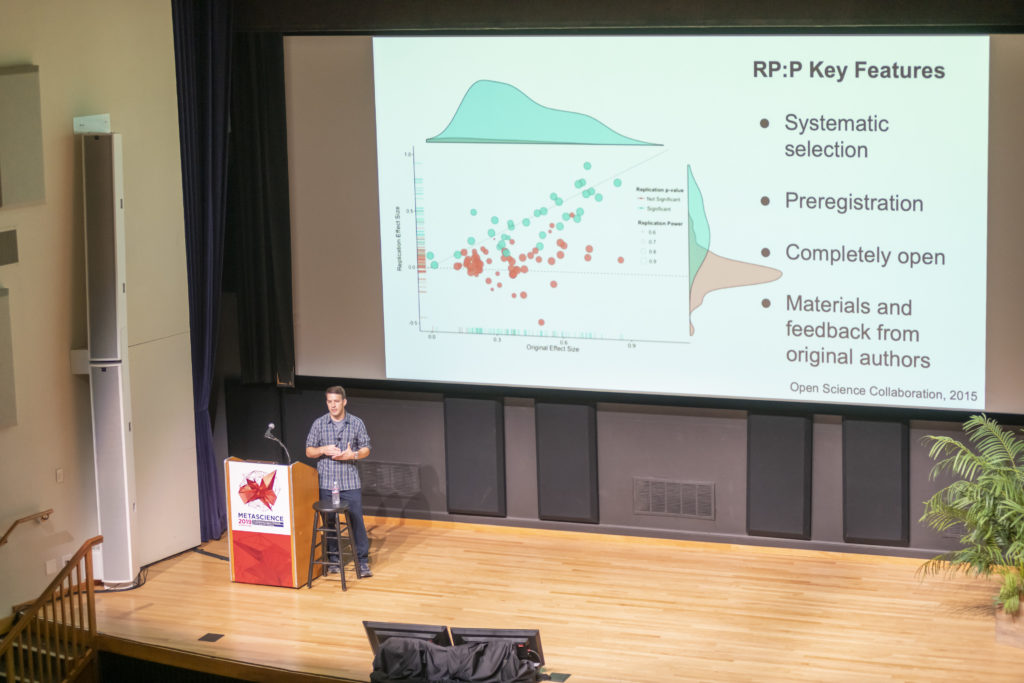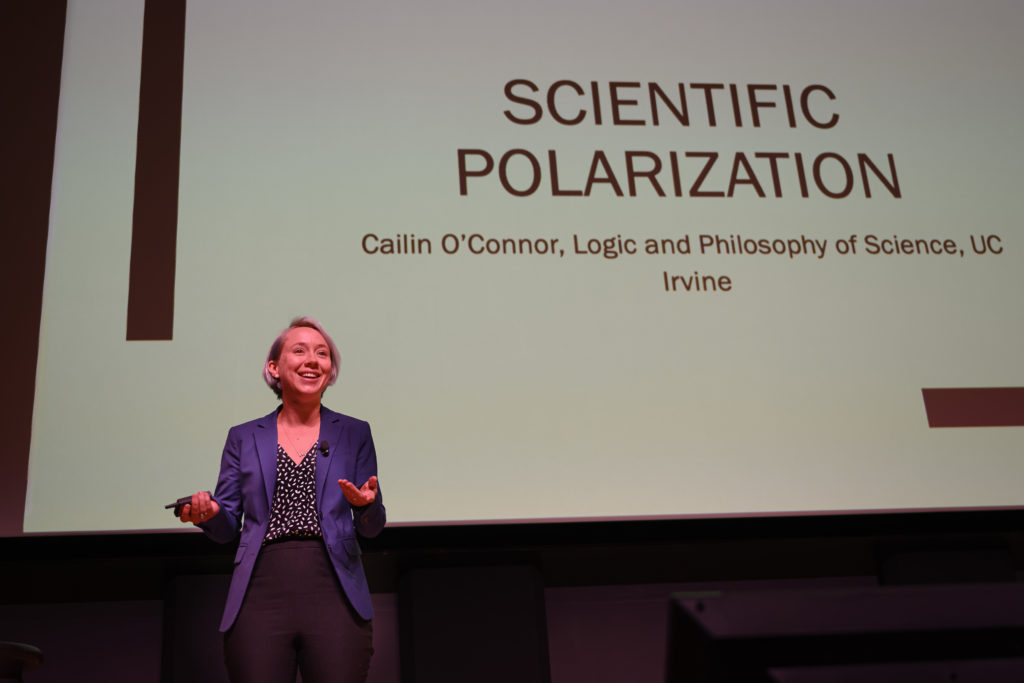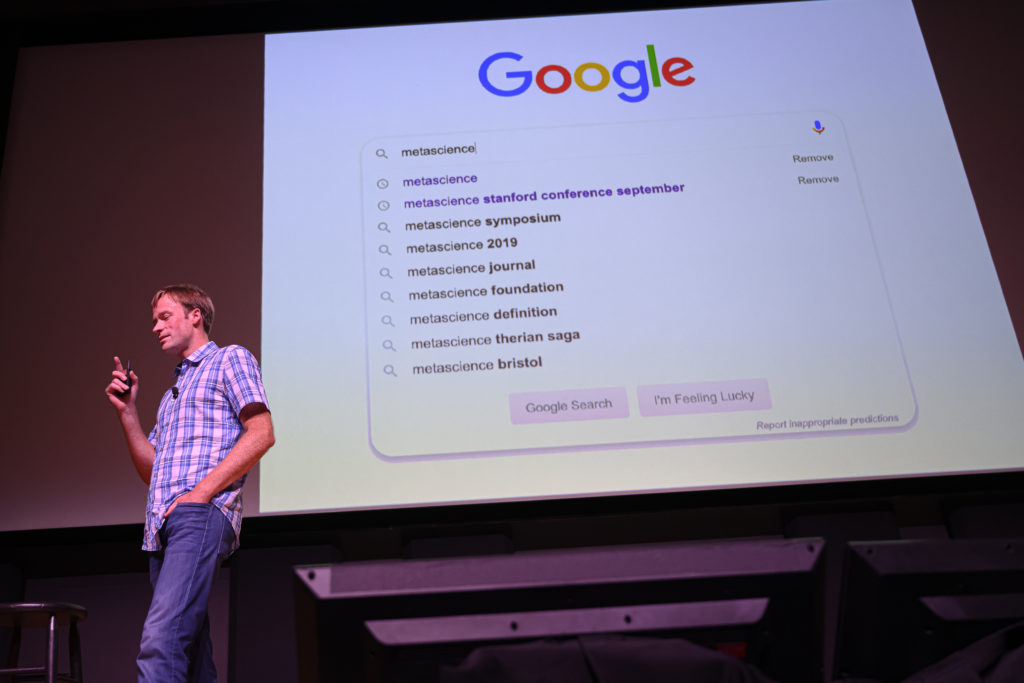Metascience 2019 Symposium
VIDEOS (sorted by topics)
The talks where held in relation to 5 topics and are listed in the chronological order as they were held at the symposium.
Topic 1: How do scientists generate ideas?
Topic 2: What is replication and its impact and its value?
Topic 3: How are our statistics, methods & measurement practises affecting our capacities to identify robust findings? Does the distinction between exploratory (hypotheses generating) and confirmatory (hypothesis generating) research matter?
Topic 4: How do scientists interpret and treat evidence?
Topic 5: What are the cultures and norms of science?
Bonus: Panels
Below the video you’ll find the profile of each speaker.
Talks of Topic 1: How do scientists generate ideas?

- Jacob Foster: Made to Know: Science as the Social Production of Knowledge (and its Limits)
- Carole Lee: Gender-based homophily in collaborations across a heterogeneous scholarly landscape
- Marta Sales-Pardo: Collaboration patterns in science
- Melissa Schilling: Where do breakthrough ideas come from?
- Dean Keith Simonton: Scientific Creativity: Discovery and Invention as Combinatorial
- Roberta Sinatra: Quantifying the evolution of scientific careers
Talks of Topic 2: What is replication and its impact and its value?

- Annette N. Brown: Is replication research the study of research or of researchers?
- Tim Errington: Barriers to conducting replications – challenges or opportunities?
- Daniele Fanelli: Low reproducibility as divergent information: A K-theory analysis of reproducibility studies
- Adam Russell: Fomenting (Rigorous) Technological Revolutions: Replication and DARPA’s Mission
- Jonathan Schooler: How replicable can psychological science be?: A highly powered multi-site investigation of the robustness of newly discovered findings
- Shirley Wang: What does replicable ‘real world’ evidence from ‘real world’ data look like?
Talks of Topic 3: How are our statistics, methods & measurement practises affecting our capacities to identify robust findings? Does the distinction between exploratory (hypotheses generating) and confirmatory (hypothesis generating) research matter?

- Andrew Gelman: Embracing Variation and Accepting Uncertainty: Implications for Science and Metascience
- Steven Goodman: Statistical methods as social technologies versus analytic tools: Implications for metascience and research reform
- Zoltán Kekecs: How to produce credible research on anything
- Edward Miguel: Innovations in Pre-registration in Economics
- Michèle Nuijten: Checking Robustness in 4 Steps
- Bernhard Voekl: Biological variation is more than random noise
- Jan Walleczek: Counterfactual Meta-Experimentation and the Limits of Science: 100 Years of Parapsychology as a Control Group
Talks of Topic 4: How do scientists interpret and treat evidence?

- Carl Bergstrom: The inherent inefficiency of grant proposal competitions and the possible benefits of lotteries in allocating research funding
- James Evans: The social limits of scientific certainty
- Fiona Fidler: Misinterpretations of evidence, and worse misinter- pretations of evidence
- Cailin O’Connor: Scientific Polarization
- Yang Yang: The Replicability of Scientific Findings Using Human and Machine Intelligence
Talks of Topic 5: What are the cultures and norms of science?

- Dorothy Bishop: The psychology of scientists: The role of cognitive biases in sustaining bad science
- Staša Milojević: The Changing Landscape of Knowledge Production
- Paula Stephan: Practices and Attitudes Regarding Risky Research
- Simine Vazire: Towards a More Self-Correcting Science
- Jevin West: Echo Chambers in Science?
Panels

- Funder Panel: Review and Future Directions
- Panel Discussion: Reflections on metascience topics and findings
- Panel Discussion: Journalists’ perspective on metascience and engagement with the broader public
EVENT INFO

Date: September 5th-8th, 2019
Location: Stanford University, Cubberley Auditorium
During this decade, we have witnessed the emergence of a new discipline called metascience, metaresearch, or the science of science. Most exciting was the fact that this is emerging as a truly interdisciplinary enterprise with contributors from every domain of research. This symposium served as a formative meeting for metascience as a discipline. The meeting brought together leading scholars that are investigating questions related to themes such as:
- How do scientists generate ideas?
- How are our statistics, methods, and measurement practices affecting our capacity to identify robust findings?
- Does the distinction between exploratory and confirmatory research matter?
- What is replication and its impact and its value?
- How do scientists interpret and treat evidence?
- What are the cultures and norms of science?
